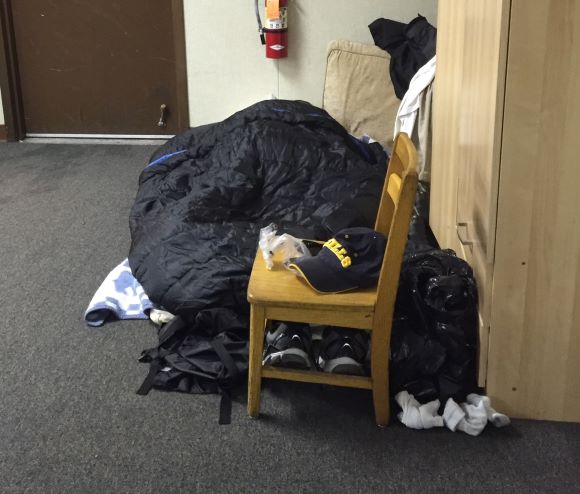“Sorry, I can’t help. You’re homeless.” (1 of 3)
Several years ago, I got an early morning call from a rather persistent religious sister who worked in our San Francisco parish. The call went something like this…
“Hey, did you hear about Jim and George?”
“Good morning, sister, and no. What happened?”
“They died last night.”
“What?”
She raised her voice, “They died last night!”
I replied, “No. I heard you the first time. I just… what happened?”
“They didn’t get into a shelter; it got cold and rained, they got soaked and died of hypothermia.” She took a deep breath and asked, “So? What are we going to do about it? What are you going to do to help me? Because we are not going to let this happen again!”
And, as we all know, you never tell a revved-up nun, “No.!”
Within a week, we had a plan that was approved by the pastor of the church. We chose and vetted around 60 men from the center as people we knew were stable mentally and emotionally and told them that anytime the temperature dropped below a certain level, and it was to rain, we would open the parish hall for them to bed down in. It would be manned by two men of the parish, one asleep as a backup and one awake overnight to oversee their safety. They would receive a hot meal in the evening, before bed, and one in the morning upon waking at 6:30.
The last thing on my mind was to go to bat for a population I knew basically very little about, but we opened this overnight situation two weeks later with huge support from the parish! Everyone pitched in. We had a pool of over 50 parishioners who were on call for any of the nights we would be “open for business.” I took the overnight awake shift for the first 20 nights we were open, and during that time, I learned several things about the people we served.

Not All Are Homeless for the Same Reason
For some reason, society loves lumping the homeless into a simple package. “Oh… They’re all drunk and drug-addled freaks that can’t tie their shoes without a hit or something!” Or “Ah, they’re too lazy to work. They complain about this pain and that pain… They don’t really want to work.” Or “They’re a daman illegal from Mexico! They came up here to rape and steal. I’m not helping any filthy thug like that!” Sound harsh? I assure you, I’ve heard much, much worse being thrown at the men I worked with.
The Small Truth
The small truth is some of these things are the starting point of the larger problem. Alcohol and drugs do take their toll on relationships. There is no denying it. And yes, more than one person I spoke with started their homeless journey this way. But here is the sad part. When they tried to change and come back into society, society turned its back on them. How? Why?
A Small Story
I knew a couple of men in the overnight shelter I worked with; one was from Mexico, and the other was from Guatemala. They had emigrated to the U.S. about 10 years before, but for one reason or another, they both had trouble finding and keeping jobs. When they first came to the shelter, they were both quiet and very wary of anyone. Neither had a great command of English, but they’d learned enough to get their meanings across.
One early spring day, after the men had been coming to the shelter for a year, the parish Deacon saw the two men pulling weeds around a statue in the parking lot and struck up a conversation. Come to find out, the men had been gardeners their entire lives. A couple of weeks later, the Deacon asked if the two men would like to help in a beautification project around the church. They jumped at the chance. The Deacon gave them the tools and plantings, then let them go at it. What those two men did was nothing short of amazing! They took basic hand tools and about $300 worth of plants and made the grounds look like a full-fledged garden of Eden. Many of the parishioners commented on the big change and asked what grounds company had done the project. The Deacon approached the two with a plan. If they were willing, the parish would supply the tools to the men and a borrowed truck from one of the parishioners. The two could work for each parishioner beautifying their yards just as they had done the church grounds.
The two men didn’t have to think long. They jumped at the chance and began the following Monday. The two men gave estimates on how much the project material would cost and the total time it would take. The Deacon had already spoken to the families and told them of what he was trying to do to help these men get on their feet, so the men would have to be paid a going rate for their time. Each parishioner agreed and paid top dollar to the two men. The results were just as amazing as at the church. In fact, one of the yards was written up in ‘House Beautiful’ magazine that year.
With the proceeds of their work, the two were able to go in together on a one-bedroom apartment in the area, and the parishioner who let the men borrow his truck ended up donating it to them and their fledgling business. As of today, these two men—homeless, from another country, not making ends meet—are now business owners, still living modestly, but on their own, and are helping other homeless men by hiring them onto their crew.
Takeaway
What happens when we don’t receive the help we need? Many of us have the internal persistence and fortitude to carry us through. But most of us will need assistance at some point in life—physical, mental, emotional… who knows? These two men came to the U.S. with hopes of a better life, but life had different plans. It wasn’t until a chance meeting with someone who saw them as worthy of help, the Deacon, that their life changed.
So, who do you look past and not see? Who is asking for your help without words? Who will help you when you need help?
“I was a stranger, and you invited me in…” Matthew 25: 36
2 of 3 “Sorry, I can’t help. You’re homeless” next week.













